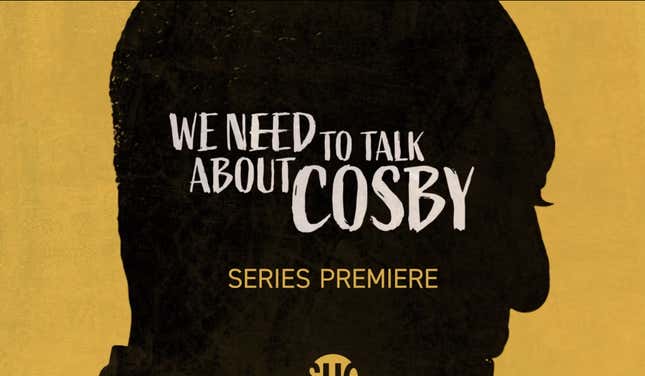
TW: Sexual assault
Bill Cosby is a revolting excuse for a human being, but also, his impact on Black America and Black culture is immeasurable.
That’s the balancing act We Need to Talk About Cosby attempts to walk. It contrasts his legacy as an entertainer with his life as an accused sexual predator.
Director W. Kamau Bell uses his life experience as a Black comedian whose own career was shaped by Cosby’s influence as a stand up, to explore what the man and his alleged crimes mean to the Black community.
The four part Showtime docuseries does a great job of putting Cosby’s legacy as an entertainer in its proper historical context, while not shying away from his horrible acts. The series examines how his rise to power enabled him to get away with whatever he wanted.
For those still struggling with their feelings about Bill Cosby, it’s a must watch. We Need to Talk About Cosby does not hedge its bets. It takes a very clear stand that Cosby did these terrible things, and there’s no doubt about it.
Jemele Hill, Marc Lamont Hill, Roland Martin, Godfrey, Doug E. Doug and Joseph C. Phillips are among those who discuss how his rise to stardom paved the way for Black people to be seen in a different light. At the same time, survivors tell their stories in unfiltered, heartbreaking interviews, relaying how he used his fame and charm to trap them in dangerous situations.
The series makes it clear Cosby knew what he was doing every single time.
“Episode 1” begins with his early career in the ‘60s, chronicling his time as a stand up at the Playboy Club, the only Black comedian who regularly performed at the venues. It deftly explains the significance of Cosby’s high profile status, the importance of his starring role on I Spy, and influence on comedy as a whole, before moving into its first harrowing account from a survivor.
Where the doc excels is when it revisits past routines and TV clips to highlight Cosby’s hypocrisy and the giant flashing red flags of what was really going on behind the scenes.
Bell lets the story unravel at an organic, unhurried pace. His experience as someone “raised by Cosby” is evident throughout the series, but he also never takes a heavy handed approach.
Survivors and their stories are given the respect they deserve, portrayed as the heroes they are.
Yes, it’s difficult to watch, and completely understandable if it’s not a series most will want to sit through. However, for the Black community it’s a story that needs to be told.
“Episode 4” gets into the hard truth that Black men were slow to believe his accusers, even as the number of women going public reached into the 30s. It delves into the pain and betrayal many Black people felt at discovering the monster hiding behind Cliff Huxtable.
Then, just as it seems we’ll get a nice ending where justice is served, filmmakers and viewers are hit with the gut punch of Cosby being released due to a prosecutorial mistake.
It’s upsetting for everyone, but Bell uses this blow to highlight how the survivors went on to change laws and advocate for other women who’ve been silenced.
We Need to Talk About Cosby is a brilliantly layered examination of an evil man who, despite what we know now, had a positive impact on the history Black entertainment. However, it never loses sight of the fact that it doesn’t matter what he did during his career, he can never be forgiven for the awful things he’s done.
We Need to Talk About Cosby premieres Sunday, Jan. 30 at 10 pm on Showtime.

